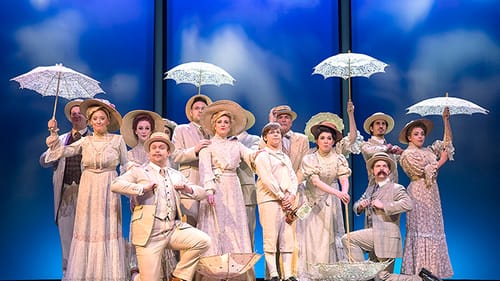Stay in the Loop
BSR publishes on a weekly schedule, with an email newsletter every Wednesday and Thursday morning. There’s no paywall, and subscribing is always free.
New music, familiar stories
Pennsylvania Shakespeare Festival presents 'Ragtime'

When Pennsylvania Shakespeare Festival (PSF) selected Ragtime as their 2018 mainstage musical some months ago, the producers couldn’t have anticipated their production would premiere amidst the tragedies occurring daily at U.S. borders. Immigration forms a major theme of E.L. Doctorow’s 1975 novel — adapted for the stage by Terrence McNally (libretto), Lynn Ahrens (lyrics), and Stephen Flaherty (music). The parallels to modern events often feel chilling.
On opening night, a hush swept over the audience as one character remarked, “immigrants are terrified of losing their children.” When Tateh (Samuel Druhora), a Jewish artist fleeing poverty and oppression in Latvia, vows to make a better life for his beloved daughter (Macie Bazella at the performance I attended), I couldn’t help but imagine his words in the mouths of countless migrants who daily face tremendous peril.
Watching these scenes unfold, the cynic in me slumped into a momentary state of despondency. How sad, I thought, that this 20-year-old musical, depicting events that happened more than a century ago, still seems so shockingly relevant — even prescient? The arc of the moral universe is long and bends toward nothing.
Shock value
But Dennis Razze’s dazzling production would not allow me to wallow. Ragtime never shies away from presenting heavy topics with appropriate force; the beauty of its music does not obscure the ugliness of xenophobia, racism, sexism, or anti-Semitism. The material’s unrelenting honesty has caused controversy, including an unsuccessful attempt to censor some of the libretto’s racist language by a high school in Cherry Hill, New Jersey.
Razze doesn’t shy away from making his audience uncomfortable. Some moments seem designed to shock, as when a firefighter hurls the n-word at Coalhouse Walker Jr. (Nkrumah Gatling), the brilliant and proud musician at the center of the story. Imbued with venomous hatred, the word cuts through the auditorium and hangs in the air.
But other instances are more subtly insidious. After Coalhouse undertakes terrorist actions to avenge the murder of his fiancée Sarah (Destinee Rea, moving and in fine voice), wealthy businessman Father (Bryant Martin) rails in disgust at Coalhouse’s “[N-word] pride.”
At that moment, we see the true colors of a man who heretofore seemed slightly backward but largely sympathetic. Martin masterfully plays the character’s ambiguity.
Although Ragtime holds an unflattering mirror up to U.S. history, it also provides a message of hope. The drama alternates between Coalhouse’s demand for racial justice, Tateh’s quest for the American dream, and the quiet liberation of Mother (Brandi Burkhardt) from passive wife to self-actualized woman.

These personal revolutions take place at the turn of the 20th-century, with historical figures including Emma Goldman (Michele Ragusa, superb and slyly funny) and Booker T. Washington (stentorian Rod Singleton) becoming part of the story.
Dreams unrealized
The musical skewers the then-budding obsession with celebrity culture, depicted largely through “Gibson Girl” Evelyn Nesbit (Carly Hueston Amburn) and Harry Houdini (Freddie Kimmel). Choreographer Stephen Casey snappily stages “Crime of the Century,” Nesbit’s signature vaudeville number, in a manner that nods to current reality television obsessions. The frivolity of Nesbit’s fame contrasts nicely with the show’s more serious messages without obscuring them.
The excellent trio of principals communicate those greater aims with grace. With a sense of moral righteousness, Burkhardt’s Mother rejects the complacency expected from a married woman of means. She stirringly sings “There are people out there/unafraid to feel sorrow/unafraid of tomorrow/unafraid to be weak/unafraid to be strong.” Over the course of the show, she becomes one of those people.
Gatling is not afraid to highlight Coalhouse’s anger and misery. His is a portrait of a man who believed in the promise of America, only to have it snatched from him by small-minded racist thugs. In the early scenes, the ragtime genre represents the freedom he anticipates at the dawn of a new century; his retreat from music signifies a sad understanding that the more things change, the more they stay the same.
Tateh represents the immigrant success story, becoming a pioneer of the film industry. But Druhora’s moving performance retains the perspective of the poor man he was, the hopeful, exploited refugee who would die to protect his family. Although he changes his name and wears fine clothes — the production uses Santo Loquasto’s Tony-nominated original designs, realized here by Courtney Irizarry — he will always be Tateh.
Tateh was able to realize the best this country has to offer. Not everyone will be so lucky, as the radio reminded me during my drive home from PSF. Ragtime walks a tightrope of optimism and uncertainty, forcing its audience to consider a difficult story from every side. That duality is beautifully realized here.
What, When, Where
Ragtime. By Terrence McNally, Lynn Ahrens, and Stephen Flaherty, Dennis Razze directed. Pennsylvania Shakespeare Festival. Through July 1, 2018, at the Professional Theatre at DeSales University, 2755 Station Avenue, Center Valley, Pennsylvania. (610) 282-WILL or pashakespeare.org.
Sign up for our newsletter
All of the week's new articles, all in one place. Sign up for the free weekly BSR newsletters, and don't miss a conversation.

 Cameron Kelsall
Cameron Kelsall